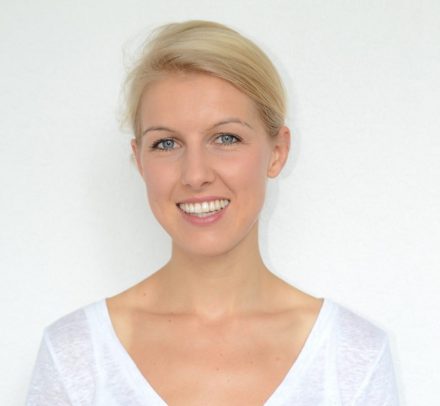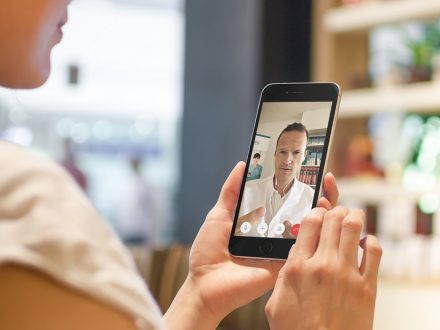Anyone wanting to implement disruptive innovations in the healthcare sector in Germany faces a difficult task. The laws and restrictions often pose too great an obstacle for startups to enter the market. Nonetheless, Munich-based startup TeleClinic took a brave step and launched an internet healthcare platform where patients anywhere can speak with medical specialists.
What led to the development of a digital, innovative concept in the field of telemedicine? Prof. Dr. Reinhard Meier, who is a radiologist at the university hospital Klinikum rechts der Isar in Munich and at the Ulm University Medical Center, noticed the trend towards telemedicine in the US and saw that it could significantly improve how patients benefit.
Through joint research on innovation in highly regulated markets at the Center for Digital Technology and Management (CDTM), Prof. Dr. Meier and Katharina Jünger, the founder and CEO of TeleClinic, came up with the idea to combine experience from the US with knowledge about regulated markets. While looking for a specialist partner in IT, they discovered Patrick Palacin, who studied computer science at the Technical University of Munich and is now a member of the founding team.
Patients do not like waiting or driving to the doctor’s office
 “Our goal is for patients to no longer need to make a special trip to the doctor’s office. In particular, our service makes it possible for people with limited mobility, such as new parents, time-strapped professionals and the elderly, to still be able to receive excellent medical consultation,”
“Our goal is for patients to no longer need to make a special trip to the doctor’s office. In particular, our service makes it possible for people with limited mobility, such as new parents, time-strapped professionals and the elderly, to still be able to receive excellent medical consultation,”
said Jünger, explaining how customers benefit. No more waiting for a doctor’s appointment, no sitting around for hours in crowded waiting rooms, no trips to the emergency room on the weekend – these are all aspects that can make healthcare much easier for a large number of patients.
The healthcare system can benefit from telemedicine
The healthcare system will also be able to benefit from the opportunities offered by telemedicine. It could, for example, take some of the pressure off of emergency rooms by providing direct answers to patients’ questions such as “Do I need to see an emergency physician, or can I wait and go to the doctor’s office tomorrow?” or “My child has a very high fever, what should I do?”
These questions can also be answered at an impressive speed, with TeleClinic patients waiting an average of just three minutes. The consultation itself lasts as long as it takes to answer all of the patient’s questions, which is an average of ten to fifteen minutes.
Although the medical consultants at TeleClinic are not legally permitted to diagnose or issue prescriptions yet, the service is catching on. Up to 150 people currently take advantage of the service each day, with the average age of patients at 57. Patients are particularly interested in getting a second opinion by video chat, for example about back problems or rashes. Search inquiries about local medical specialists are also common.
Germany has some catching up to do
The german E-Health Act’s action plan includes the field of telemedicine. It legally requires health insurance companies to assume financial responsibility for online video consultation as of July 2017, provided that the physician has already seen the patient in real life. Although TeleClinic will not directly benefit from this measure, they still consider it to be a step in the right direction. If nothing else, it will attract more attention and foster the acceptance of video consultations with a doctor.
Other European countries are much further ahead. Switzerland and the UK have offered telemedicine services for quite some time. The German market does have a few service providers who offer medical consultation hotlines or online video consultations. TeleClinic combines both. Telephone consultation is particularly useful for the elderly, while a video chat on a computer or a smartphone is more suited for people who are on the go, for example on a business trip or vacation.
A startup grant and venture capital for TeleClinic
The company was founded back in 2015, and officially got going in May 2016. The Munich startup now has over 1,500 active users, who are able to receive consultation from around 150 medical experts specializing in approximately 30 different fields. The startup team currently includes 26 employees; further positions have been posted.
The founders received support from the Exist Business Start-up Grant until the fall of 2016. Various business angels then got on board during the seed financing round as venture capitalists. The startup was able to lay a financial foundation amounting to 600,000 euros.
And what do they see happening next? Katharina Jünger replied:
“Since Germany is going to have to adapt to digitization very soon just like other countries, we view TeleClinic as an important step in the direction of a revolutionized healthcare market in Germany.”
Munich Startup wishes the founders and TeleClinic all the best in revolutionizing the German healthcare industry and beyond.

